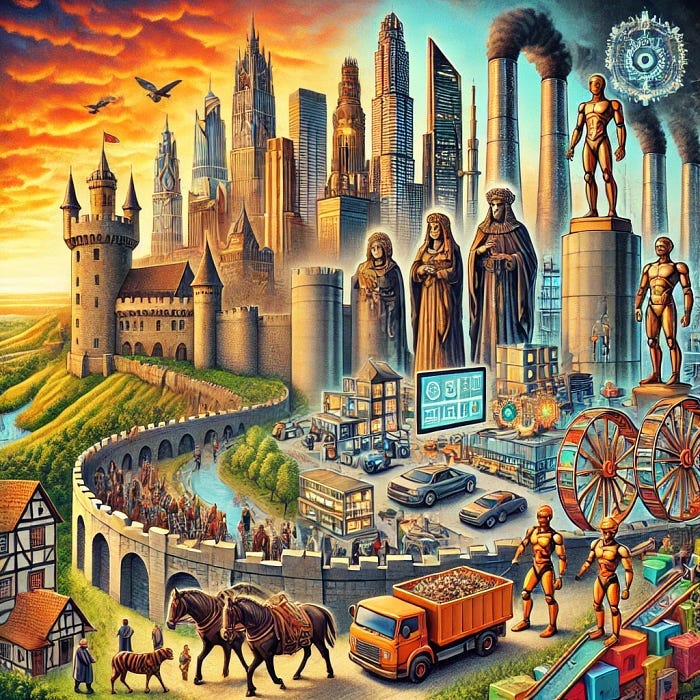The Plutocratic Paradox: Why Entrusting the Elite to Solve Inequality Is a Grave Mistake
Lessons from History as Automation and Singularity Reshape Our World
Illuminating Paths to Equity in the Age of Change
A Historical Turning Point
Introduction: A Persistent Dilemma
Wealth inequality is a persistent force that has shaped societies throughout history. From feudalism to the industrial revolution, and now to an era of pre-industrial automation and the looming singularity, wealth and power have remained concentrated in the hands of a select few. This concentration has often created systemic imbalances that perpetuate inequality rather than resolving it.
Today, as we face unprecedented technological and economic transformation, the contradiction of entrusting the rich and elite to address wealth inequality has never been more apparent—or dangerous.
Wealth Inequality Across the Ages
1. Feudal Hierarchies and the Origins of Inequality
In medieval times, wealth was tied to land, controlled by monarchs and aristocrats. Peasants, bound to the land, had no path to economic freedom. The system of wealth reinforcement ensured that power remained firmly in the hands of the few, leaving the majority voiceless.
2. The Industrial Revolution: Economic Growth, Deeper Inequality
The advent of industrial capitalism fueled unprecedented economic growth, but at a significant cost. Factory owners accumulated vast fortunes while workers endured unsafe conditions and poverty wages. Efforts to address these inequalities often faltered under the resistance of the wealthy elite, who wielded political influence to maintain the status quo.
3. Modern Capitalism and the Rise of Oligarchies
In today's global economy, billionaires command more wealth than some nations. Capital is rewarded far more than labor, exacerbating income disparities. The mechanisms of this inequality—tax loopholes, deregulation, and lobbying—are embedded in the very systems the wealthy control.
The Plutocratic Contradiction: Why It Fails
Conflict of Interest
The elite benefit from wealth concentration. Policies they propose often protect their interests, such as resisting labor rights reforms or lobbying for tax cuts.Trickle-Down Economics: A False Promise
The theory that wealth at the top "trickles down" has been debunked. Instead, wealth tends to accumulate, widening the gap between the rich and poor.Philanthropy: A Misdirection
While philanthropy by the wealthy is commendable, it cannot replace systemic reform. Voluntary giving often serves to bolster the public image of elites rather than addressing the structural causes of inequality.Democracy Undermined
The domination of policymaking by the rich undermines democracy. Campaign contributions and lobbying ensure the interests of the wealthy are prioritized, sidelining the majority.
Pre-Industrial Automation and Singularity: The New Divide
1. Automation’s Threat to Equity
Automation will displace millions of jobs, disproportionately impacting low-income workers. Without redistributive policies, the wealth generated from automation will flow to those who control the technology, creating a new economic divide.
2. Singularity and Power Consolidation
As artificial intelligence surpasses human intelligence, decisions on resource distribution and ethical governance will shape the future. If these decisions are dominated by the elite, inequalities will deepen, and societal divides will grow.
Charting a Path Forward
1. Inclusive Governance
Incorporate voices from marginalized and economically disadvantaged groups into policymaking.
Promote diversity in leadership to ensure equitable decision-making.
2. Systemic Redistribution
Implement progressive taxation and close tax loopholes.
Invest in universal healthcare, education, and public infrastructure.
3. Strengthen Democratic Institutions
Reform campaign finance laws to reduce the influence of wealth in politics.
Ensure transparency in governance to prevent elite control of public policy.
4. Grassroots Empowerment
Support labor unions, cooperatives, and community organizations advocating for workers' rights.
Encourage grassroots-led initiatives that prioritize local needs over elite interests.
Conclusion: A Crossroads for Humanity
The concentration of wealth and power in the hands of the elite has failed to address systemic inequality throughout history. Entrusting them with solutions to the problem they benefit from is a paradox that risks perpetuating the cycle of inequity.
As we approach transformative technological milestones, such as automation and singularity, the stakes have never been higher. The decisions we make today will determine whether the benefits of progress are shared broadly or concentrated narrowly.
The solution lies in systemic reform, grassroots empowerment, and inclusive governance. By learning from history and prioritizing equity, we can create a future where opportunity is accessible to all, not just the privileged few.
Let us embrace this challenge with the resolve to build a just and equitable society.


